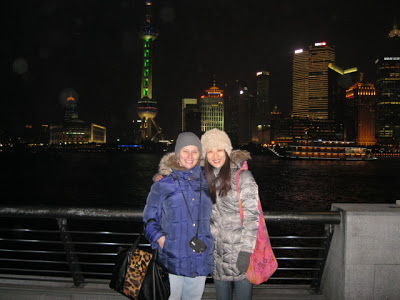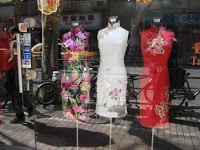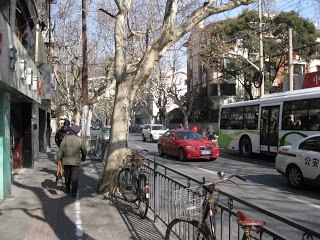
February 17 — Shanghai Bund. My 33 year old friend Wang Qian is one of the best feasts of human nature that I have encountered in China.
Call that a mixed metaphor. But it’s true.
I ran into her at the Bookworm Book store in Beijing last September during a lecture on the Gaia hypothesis. During the lecture, a British naturalist and poet proceeded to assure our international clique of coffee klatch sophisticates that Nature (Gaia) will handily overcome all the polluting iniquities inflicted by human kind this past century. Never mind that during the Permian Period “wipe-out” 252 million years ago, 95% of the all life on earth went extinct in less than 200,000 years.
After his lecture I remember feeling “juiced up.” When I raised my hand and questioned his thinking, mostly the implications of his thinking — namely that no matter how much foul air and water we dump into the environment, Mother Nature will readjust — lo and behold, the audience burst into applause.
After the lecture was over (I seem to recall the Brit was oddly paired with a Czech poetess who was awfully eloquent, though I can’t remember her name), a lithe, 5’10” long-haired Chinese beauty sat down at our table with a Northern Irish girl named Hannah. Hannah had also questioned the scientist during the lecture; she maintained a calm demeanor and argued against his viewpoint persuasively, despite the fact, she later acknowledged, she was practically screaming inside her head, trying to marshall all her forces to shout the guy down.
Hannah, Qian and I had a long chat, along with fellow ICB instructor Robert Rostermundt, who was my “date” for the evening. I discovered Hannah was traveling through Beijing and Western China with Wang Qian (I regret to say I can’t remember how they met); regretfully she was on her way back to Europe after a period of Chinese study. I took Qian’s phone number and didn’t think much about it. We promised to get in touch sometime soon. A few weeks later, finding myself alone again on another Saturday night in Beijing, I called her. She was in Guilin, Guangxi province with friend Hannah, but promised to call me when she came back. For weeks I was completely snowed under with teaching work and student papers.
One evening, though, she called me. I met her at a subway station, one of the dozens of vast underground caverns that snake through a city so enormous it dwarfs New York, Rio, and London. Soon thereafter I discovered I had met one of the loveliest world citizens I’ve ever had the privilege to know.

Wang Qian comes from Shanghai. Does that explain everything?
Every hutong, every foreign restaurant, ever soaring tower with a gigantic “window” of empty space in the middle, every shopping center, every tiny little shop with teddy bears in it, every piece of international paraphernalia that can be found on a city street — all of these things are Wang Qian.
She brings me to tiny crooked streets in Shanghai, my favorite city in all of China. She helps me find a ridiculously expensive chi pao (traditional Chinese dress) for my daughter’s wedding, and we bargain down and go back and forth and back and forth over whether it really is worth it and I can’t tell; her smile is somehow reflected back at me in the mirrors, the shop keepers, the woven white silks. She’s about as naturally happy as I am naturally brooding and intense. Perhaps she is the better half I lost at about age eight. I don’t really know.
Qian, it turns out, is a journalist with many credits, including several years with Phoenix Weekly, one of the best journals in China. Of course there is no such thing as a completely independent journal in China, because the media are controlled by the government. But Qian wants to be a foreign correspondent in China writing in English. Last fall, she was taking a sabbatical and working for a Western journalist as a researcher, hoping to improve her English to pass the IELTS exam, which would give her a passport to England or the U.S. for a year or two to study political science on a graduate fellowship. This is the path that many young people take; Qian is exceptional in that she is already out of the career gates by a good ten or eleven years, and, being from Shanghai and already qualifying as an epicure, she has a hankering to see Europe.
We have met over many dinners in small hutongs in Beijing, including a hutong across from the LAMA Temple (which has a lot of garish Buddhist statuary, including a Kuan-yin made out of a 200 foot tall tree imported from Tibet.) Twice we have eaten in a Greek restaurant there (white-washed walls and rotund Mousaka). Last November she took me to Thanksgiving dinner, with turkey and fixings at the Culture Yard, a meeting place and tutoring center for ex-pats in Beijing
situated near the 2nd ring (these “rings” refer to vast concentric circles of highways that radiate out from the center of Beijing, which is roughly situated at the bulls-eye of Tian An Men Square and the Forbidden City). Wherever I go with Wang Qian, I find something that reminds me of home.
Three weeks ago Qian and I met in Shanghai, one of the highlights of my time here. I took the gao tie (high-speed train), which was notorious in 2010 for its accidents and ed issues with electrical switching equipment and cracked steel casings (the Wenzhou train crash in July 2010 took 40 lives and injured 191). These problems have since been addressed, according to government announcements (Caixin media led the charge in exposing the railway scandals). On the train, we sailed along from Beijing’s South Station to Shanghai in five hours. The top speed, posted above my seat on a chiron, along with Chinese rock videos, was 306 kilometers per hour, although 302 kph was pretty much the clip.
My weekend in Shanghai also flew by. Freezing by the Huangpo river, Qian and I walked at night to the Bund, the old international commercial district, which had its heyday in the 1930s. The place was luminescent. And the Putong skyline with its space needles and enormous revolving globes took away my breath and even some memories. Shanghai is divided into two parts — Putong and Puxi –by the Huangpo river which is situated at the mouth of the Yangtze river.
In 1995, when my kids were still small, I had visited Shanghai’s waterfront and stayed with friend Jason Wu’s sister and her husband in a lovely teak-floored house that had been divided up during the Communist regime. The house reminded me of the fallen beauty of the Zhivago era. Every floor was allocated to many different families. I stayed in one of the preserved rooms kept as a guest bedroom by Jason’s sister (I regret to say I have lost track of her). It had a real bathroom — no squat toilets. It had a real bed and a radio and an air conditioner. This was affluence. The waterfront then had the space needle and a few buildings, and the haze over the Huangpo made it hard to see. But when I stood in the same place three weeks ago, I was dazzled. Architects had completely re-sculptured the skyline with revolving glass ball convention centers, restaurants and other soaring geometries. Qian and I took a series of silly pictures together; I felt like a kid again (how did I miss the fun with girlfriends?)
And the rest of the trip, with lovely food, visits with friends, and a delicious taste of Shanghai excess — in coffee shops, bakeries, and dress shops on every crooked little street in the French Concession (which resembles a mini Paris), made me realize how bourgeois I am.
Did Robert Frost say that “happiness truly makes up in height for what it lacks in length?” It was on our Shanghai escape that I found out that Qian had recently separated from her long-time boyfriend and was taking the first tentative few steps on her own. She was so graceful about it in correspondence that I had had no idea. After her break-up, she was staying with parents in Putong to regroup, re-study for the IELTS, and relaunch her career in Beijing when she returned shortly after I did.
A week later we met for Korean Barbecue in Beijing. She was giggling and happy, always telling me, “Be happy.” She took the IELTS the next day without a hitch and reported she had done much better. Then back to a friend’s house until she can locate the right job and apartment in Beijing. I hope next year will bring new things to her, perhaps a fellowship in the States. Given how difficult it is to write professionally in a foreign language, especially if you were not born to a bilingual family, I’d call her my Donna Quixote. Whatever windmill she tilts, I’ll be cheering her on. AE




One thought on “In Beijing and Shanghai: Feasts and Leftovers”